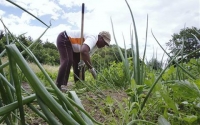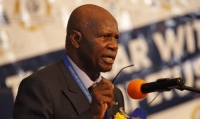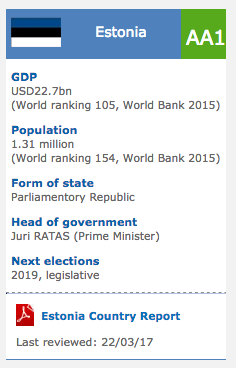Zimbabwe: Muchadeyi Ashton Masunda is mayor of Harare
2012/12/05

Muchadeyi Ashton Masunda is mayor of Harare, capital of Zimbabwe. He holds a bachelor of law (honors) degree from the University of Zimbabwe and is a fellow and accredited tutor of the Chartered Institute of Arbitrators in the United Kingdom.
Harare with 2,800,000 in its metropolitan area (2006). Administratively, Harare is an independent city equivalent to a province. It is Zimbabwe's largest city and its administrative, commercial, and communications centre. The city is a trade centre for tobacco, maize, cotton, and citrus fruits. Manufactures include textiles, steel, and chemicals, and gold is mined in the area. Harare is situated at an elevation of 1483 metres (4865 feet) and its climate falls into the warm temperate category.
Harare is the site of the University of Zimbabwe, the largest institution of higher learning in Zimbabwe, which is situated in the suburb of Mount Pleasant, about 6 km north of the city centre. Numerous suburbs surround the city, retaining the names colonial administrators gave them during the 19th century, such as Warren Park, Borrowdale, Mount Pleasant, Marlborough, Tynwald and Avondale.
- Related Articles

Africa's Relationship With China Is Ancient History
2017/07/02 In 2002 South Africa's Parliament unveiled a digital reproduction of a map - of China, the Middle East and Africa - that some speculated could be the initial map of the African continent. The Da Ming Hun Yi Tu - the Comprehensive Map of the Great Ming Empire - was drawn up around 1389 during the Ming Dynasty, according to historian Hyunhee Park.
Africa: Making Things Happen at the Bank - 'Not a Talk Shop' - Akin Adesina
2017/07/02 Dr. Akinwumi Adesina is focusing on five areas to achieve the African and world goals for a prosperous continent since becoming president of the African Development Bank - Africa's major public financial institution in September 2015. He was a keynote speaker at this month's Corporate Council on Africa's U.S.- Africa Business Summit in Washington D.C. and moderated a lively panel with five African government ministers. He as well received the Gene White Lifetime Succcess Award from the World Child Nutrition Foundation. This week, he was named the 2017 recipient of the World Food Prize, a prestigious honor that includes a $250,000 award. In an interview in Washington, DC, Adesina discussed the Development Bank's ambitious schedule and his vision for attracting the increase capital Africa needs. Posting questions for AllAfrica was Noluthando Crockett-Ntonga.
Climate change laws around the world
2017/05/14 There has been a 20-fold increase in the number of global climate change laws since 1997, according to the most comprehensive database of relevant policy and legislation. The database, produced by the Grantham Research Institute on Climate Change and the Environment and the Sabin Center on Climate Change Law, includes more than 1,200 relevant policies across 164 countries, which account for 95% of global greenhouse gas emissions.
Why Zimbabweans Are Always Short of 'Food'
2015/07/13 THE phrase 'gore rezhara' or 'umyaka wendlala' - the year of famine - is familiar with most Zimbabweans of my age. Up until the late 1970s, our grandparents and parents tended to calibrate historical eras with 'landmarks' of years at the same time as hunger and famine were at their worst. Massive national food deficits particularly in vulnerable regions like Matabeleland, the Midlands, Masvingo and some parts of Mashonaland West were a common phenomenon. From presently on, it was very rare to hear of anyone dying of starvation.
Finance minister Patrick Chinamasa tells Paul Wallace
2014/07/11 Zimbabwe’s economy is on the verge of recession, with low consumer request and a liquidity crunch putting its businesses under plenty of strain. Against this backdrop, finance minister Patrick Chinamasa tells Paul Wallace how he has started to rebuild its ties with multilateral lenders in a bid to access new credit.
- Zimbabwe News
-
- AFGHANISTAN: UNWTO: International tourism – strongest half-year results since 2010
- BOTSWANA: Why governments need to support the financial sector to meet the unserved needs of smallholder farmers
- BOTSWANA: International Arrivals To Africa Reach More Than 18 Million In 2017
- ZIMBABWE: Zimbabwe economy recovering thanks to agric and mining
- ZIMBABWE: Behind the scenes, Zimbabwe politicians plot post-Mugabe reforms
- ZIMBABWE: Zimbabwe: U.S.$300 Million for Kondo Dam
- Trending Articles
-
- SOUTH AFRICA: Nigeria and South Africa emerge from recession
- BAHRAIN: Bahrain issues new rules to encourage fintech growth
- ARUBA: Director of Tourism Turks and Caicos after Irma: Tourism, visitors, hotels current status
- ANGOLA: Angola: Elections / 2017 - Provisional Data Point Out Qualified Majority for MPLA
- WORLD: How fair is our food? Big companies take reins on sourcing schemes
- NIGERIA: Nigeria has been one of the hardest-hit economies due to its over-dependence on oil




.gif?1356023993)





